How Russian theatre is speaking truth to power
Simply sign up to the Life & Arts myFT Digest -- delivered directly to your inbox.
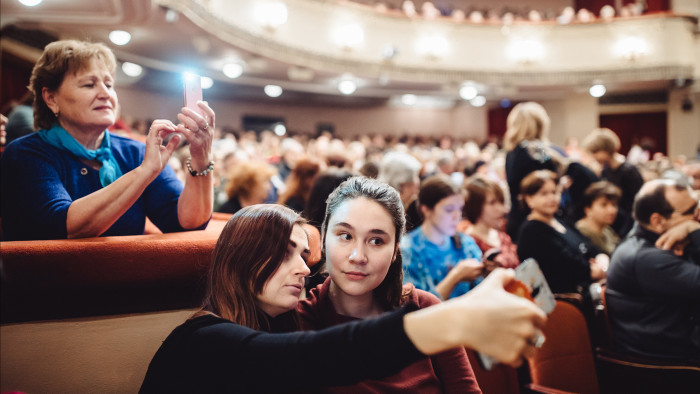
One of the most striking points in any play is the loudest laugh. When that moment comes during Smile Upon Us, Lord, on a chilly January night at the Vakhtangov Theatre in Moscow, it’s intensely surprising. The jester of the piece delivers a trio of traditional Jewish jokes, ending on a zinger. “What do you think of the government?” “Same way as I think of my wife,” comes the reply. “I love the government. I fear the government.” A pause for the punchline. “I want another government.” The entire theatre erupts. So much for Moscow being gripped by a lack of a sense of humour.
To read the news outside Russia, you’d think that any political jokes would fall flat in Moscow and that theatre listings must be full of one-man shows extolling the greatness of one V Putin. (They’re not.) In Russia, no matter the limitations, theatre still really matters. The repertoires of Moscow’s theatres are packed with challenging and interesting choices, and box-office numbers have never been better. As Vakhtangov producer Oksana Nemchuk puts it: “Art is an important part of national thinking. It’s more truthful than what you can pick up from the news.”
With Russia’s elections just weeks away and the Trump-Russia inquiry looking more Dostoyevskian by the day, surely there has never been a more important time to understand what makes Russians laugh and cry. Looking at the surface of things culturally in Russia, it’s often hard to know what’s funny and what’s tragic. In January the British comedy The Death of Stalin , directed by Armando Iannucci, had its distribution certificate withdrawn in Russia, in effect banning the film. One politician, Yelena Drapeko, told RBK News she had “never seen anything so disgusting in my life”. Last year a Russian cinema chain cancelled screenings of the epic film Matilda, a dramatisation of the love affair between the last tsar Nicholas II and his mistress, following protests by a group calling themselves Christian State, Holy Russia. The message? You can’t criticise Stalin. And you can’t criticise the tsar. You couldn’t make it up.
Recent headlines from the theatre world are equally disturbing. Since August 2017, Kirill Serebrennikov, an acclaimed director and head of the progressive Gogol Centre, has been under house arrest, accused of embezzling over £1m in government funds. Many see his detention as symbolising a political crackdown on the arts. The Bolshoi Theatre premiere of his ballet Nureyev, about the life of the dancer, was delayed by five months. When it was eventually staged, Serebrennikov was unable to attend because of his house arrest. The opposition TV channel Dozhd reported that a priest who acts as a spiritual adviser to Putin had complained about Serebrennikov’s film The Student , a critique of the Orthodox Church. These allegations were denied.
It is against this fevered cultural backdrop that the Vakhtangov Theatre brings Smile Upon Us, Lord, a production packed with black humour, double meanings and allegory, to the Barbican Theatre in London next week. The story of Jewish Lithuanians in the early 1900s, it became part of this influential theatre’s repertoire in 2013 and is a hit in Moscow.
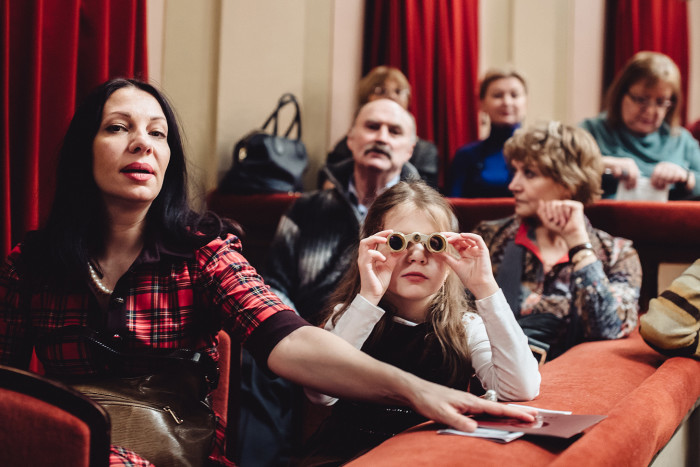
It’s a fascinating choice to bring this production to the UK: it’s ambitious, experimental, bold and a real departure from the classic glamour of the theatre’s last outing in London in 2015, a lavish production of Eugene Onegin complete with a (stuffed) dancing bear. Eugene Onegin opened to five-star reviews, the English surtitles proving no barrier to audience appreciation. (Although the producer Oksana Nemchuk happily admits that their London audience is made up of at least 50 per cent Russians, thrilled to see their own language spoken on the British stage.)
A meditation on the fate of the Jews in the early 20th century, Smile Upon Us, Lord tells the story of a stonecutter called Efraim (masterfully played by Sergey Makovetsky, an actor as at home on stage as on screen and beloved by Russians). Efraim makes the journey from his shtetl to the Lithuanian capital Vilnius in search of his son, who is awaiting trial for the attempted assassination of the governor-general. He picks up two companions en route and they all face dangers that clearly prefigure those faced by the Jewish people in the years to come.
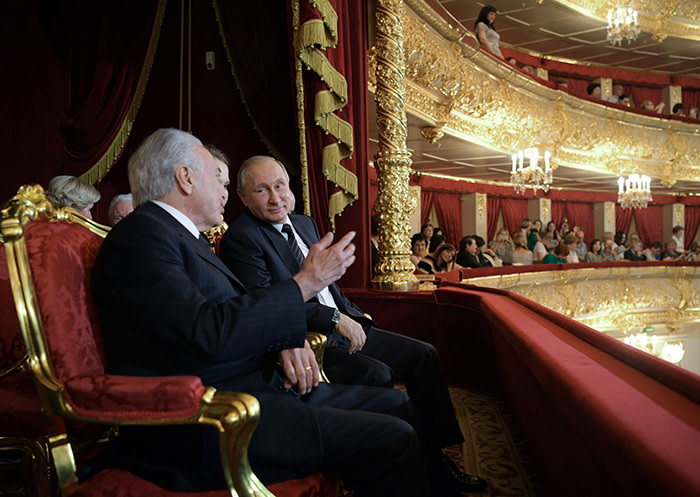
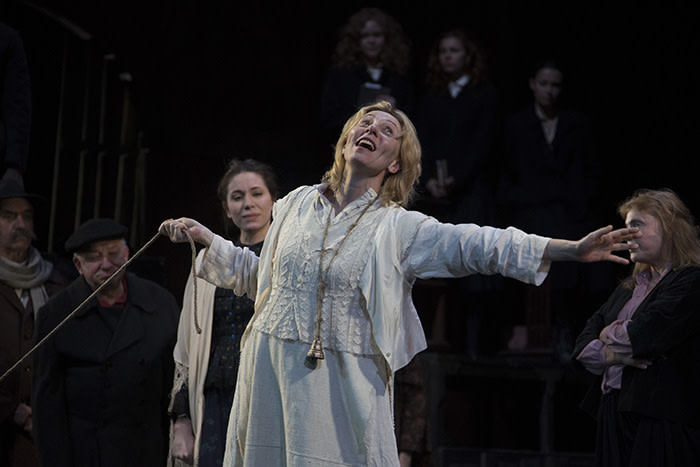
Yes, it is pretty upsetting, in case you were wondering. But there are also a lot of jokes. Highlights include the fool/jester, played by Viktor Dobronravov (who was young Onegin in their last Barbican production), and a skittish, loony she-goat, played by Yulia Rutberg. (Yes, I did just say she-goat. Like British theatre, Russian theatre can do bonkers rather brilliantly.)
The play is adapted from two novels by Lithuanian writer Grigory Kanovich and is directed by the Vakhtangov’s artistic director Rimas Tuminas, also a Lithuanian. Trailing rave reviews from outings in Boston and New York, it has an inconclusive, open-ended narrative reminiscent of Waiting for Godot. As Efraim sets off on his travels riding atop a caravan of rubble, suitcases and wardrobes that vividly conjures up the Holocaust, you watch with a sense of dread as you know that he can only be headed to a very bad place indeed.
At the end of the performance I saw in Moscow in January, Muscovites rushed to the footlights to hand flowers and carrier bags of gifts to their favourite actors. This always happens at Russian plays and it’s entertaining to watch: a fan will step back and discreetly lower the bouquet if the wrong actor steps forward for it. I’ve always been sceptical about this adulatory behaviour and I later asked the producer if the theatre ever provides flowers for the audience. She was horrified that anyone would think such a terrible thing. “Of course not! People do it because they want to.” She lowered her voice. “It’s a mark of profound respect. And don’t let the actors hear you say that. They’ll be ever so upset.”
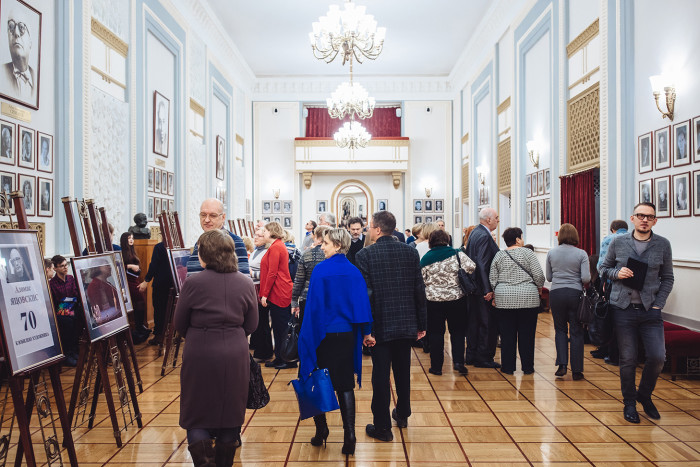
It’s hard for a cynical westerner to understand just how significant the theatre has always been for Russians. And still is to this day. In 2018, business is booming. Like most Moscow theatres, the Vakhtangov sells an astonishing average of 97 per cent of tickets to each one of the 100 performances it puts on every month across six stages. During the interval of Smile Upon Us, Lord, young Instagrammers queued up to take selfies with cast portraits in the foyer. (Not even with the cast. With their photographs.) While some of the crowd were clearly moneyed and wouldn’t look out of place in a Paris or New York theatre, there was a Soviet vibe that has persisted. It’s not old-fashioned or sad to dress up for the theatre, almost in a self-consciously ostentatious way. I watched a man closely resembling a 1970s cabaret version of Lech Walesa, complete with (non-ironic) walrus moustache, lilac ruffle shirt and purple velvet suit and matching bow tie, treat himself to a caviar sandwich.
This is an audience drawn from the growing middle class. In a city where the average civil servant earns $2,000 a month (according to Rosstat, Russia’s federal statistics agency), theatre tickets roughly cost between 100 roubles (£1.20) and 7,000 roubles (£85). The Lech Walesa lookalike might go to the theatre a couple of times a month.
When I met Kirill Krok, the general manager of the Vakhtangov, in his office over Russian chocolates and espresso (which he proudly made himself with a pod coffee machine), he was open about how the theatre operates. Some £6m of the Vakhtangov’s annual income is ticket sales, Krok says; £5m is government subsidy. On the question of political interference, he says quickly: “The minister of culture is in charge. But we are free to put on whatever we want.” Their tradition is firmly based in what we call repertory theatre: a repertoire of productions performed on a rotating basis. Smile Upon Us, Lord has, for example, been in the theatre’s repertoire for five years and might have an outing several times a month. This could go on for years, with audience demand dictating the lifespan of a play.
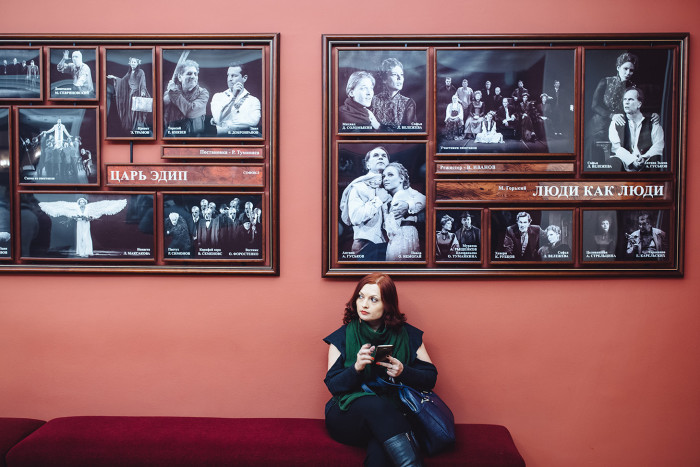
This system means it’s hard to get new work premiered in Moscow. (Rep lends itself better to classics.) And it also means that audiences tend not to read as much into the political meanings of plays as we might, because the play has not been scheduled to come out at a specific time, with the assumed short shelf-life that a West End play would have. Nonetheless some of the lines in Smile Upon Us, Lord made me raise an eyebrow: “Thoughts have been replaced by bullets.” “We would be better off as animals — they suffer less.” But producer Oksana Nemchuk says Russian audiences interpret the play’s themes far more generally: “For us, it’s a story about humanity and parenthood. The symbols are universal.”
The other interesting story behind the Vakhtangov is also glossed over. The artistic director is Lithuanian. Everything about the play is Lithuanian. And the producer is Ukrainian. In the current climate in Moscow — where flights to Kiev, Ukraine, are suspended in a three-year trade war — a play telling the story of a former Soviet republic, directed by someone from that former republic . . . It’s an interesting choice during difficult times. Lithuania very happily joined the EU in 2004. (Bear in mind that the very idea of Ukraine joining the EU is a massive headache for Russia.)
According to the official political narrative, relations between Lithuania and Russia are not uncomplicated: in January Maria Zakharova, the Russian foreign ministry’s spokesperson, accused Lithuanian politicians of wanting to “settle historic accounts with Russia”. Add to this the fact that the Lithuanian authorities are currently enforcing a blacklist of 49 Russians suspected of human rights violations, corruption or money laundering, a list modelled on the US’s 2012 Magnitsky Act. (This law bars Russian officials suspected of human rights abuses from entering the US; Trump’s ambiguous attitude to it is used — both at home and abroad — as an indication of his stance towards Russia.)
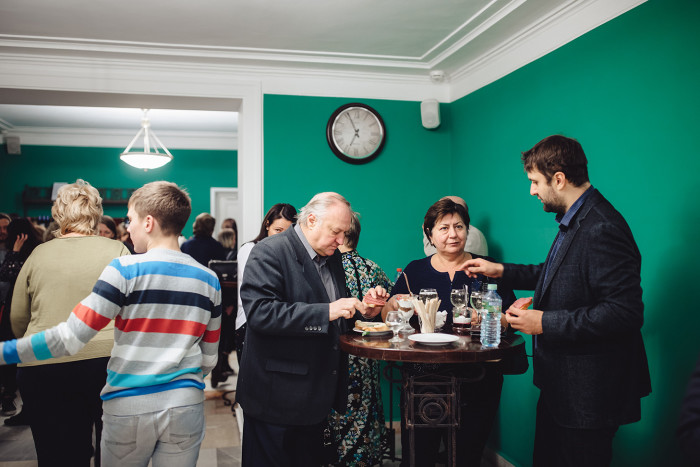
In this context, this play is symbolic of something that is difficult for us to understand outside of Russia: there is more room than we might think for collaborative work and for a plurality of views. Of course, it would be surprising if a Moscow theatre mounted a production about Ukrainian independence right now (at the very least, I suspect this would be commercial suicide, rather like staging an earnestly pro-Remain play outside of London). But producing a play that is controversial, difficult and verging on the political? Not as taboo as you might imagine.
In Moscow, the stage is not exactly a place of dissent, but it’s not doffing its cap to the establishment either. Productions of the work of Michael Frayn and Tom Stoppard are regularly staged. Current productions in Moscow include a musical Pride and Prejudice, a political satire based on The Brothers Karamazov, and a stage version of Woody Allen’s Husbands and Wives, all at the Moscow Art Theatre. At the Satirikon there’s Othello, a Russian take on Pygmalion called (rather hilariously) London Show, and an adaptation of Dostoyevsky’s Notes from the Underground by Konstantin Raikin, son of the great Soviet theatre actor Arkady Raikin. Yes, there is an emphasis on looking back and re-examining the past. But, still, there is room for controversy and suggestion. In 2016, the same Konstantin Raikin gave an uncompromising speech for the human-rights organisation PEN America that referred to the “hideous attack on artistic freedom” that Russia was facing. It is possible to voice these thoughts and still perform.
However. Some believe the premiere of the Bolshoi Ballet’s Nureyev was delayed in oblique reference to the 2013 law prohibiting “promotion of homosexuality”. (The production did not seek to obscure any of the well-known details about Nureyev’s biography, including his sexuality, and caused a minor scandal by flashing up a giant full-frontal Richard Avedon portrait of the dancer for — gasp — several seconds.) Writing in The Moscow Times last month, cultural critic Yury Saprykin concluded that “cultural figures feel compelled to censor themselves” and referenced “the new conflict between the Russian state and the creative elite”. The rules are hazy, he added. The punishment for violating them is not.
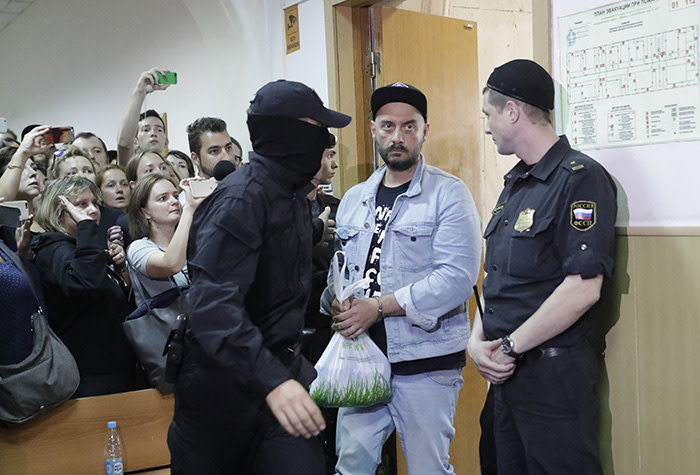
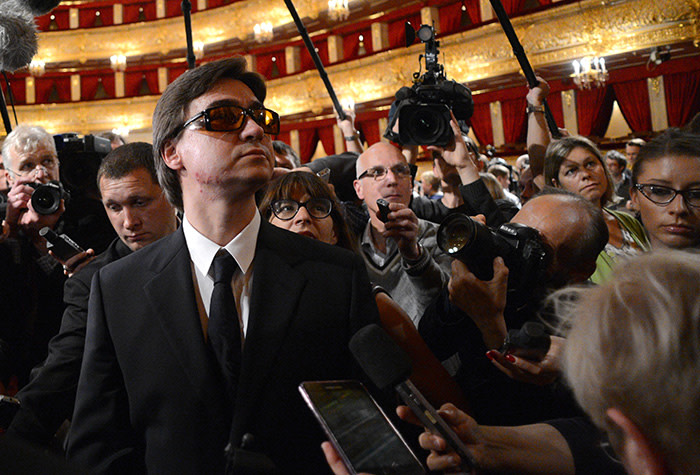
The playwright Valery Pecheykin is one of the few who have gone on the record to suggest that the Serebrennikov case is not about financial impropriety — it’s about artistic control: “Things look very different from our point of view.” He said that Serebrennikov is one of the only directors to stage “provocative, independent, tolerant works” that “cover the full range of human sexuality”. At the eventual premiere of Nureyev in December, present in the audience in dark glasses was another reminder of the complications of working in the arts in Russia: Sergei Filin, the former Bolshoi director who was the victim of an acid attack in 2013 that left his sight permanently damaged. All Moscow’s cultural and political elite were in attendance and there was a 15-minute standing ovation. Putin, though, was absent. He is apparently not a fan of theatre.
There’s got to be some level of self-censorship when you’re working in this environment. I put this question to Sergei Ostrovsky, a lawyer, keen theatregoer and co-chair of Pushkin House, the centre for Russian culture in London. He agrees that despite occasional outbursts, the Moscow theatre scene gives off the impression of not wanting to rock the boat. It doesn’t see political provocation as its job: it wants to put on productions that appeal to its audience. That means nothing too controversial. “Yes, call it a form of self-censorship or a conflict of interest,” says Ostrovsky. “Even liberal-minded theatres are financed by the state to a large extent. There are also plenty of vocal and aggressive interest groups (religious, political, etc) that consider theatre important enough to direct their efforts — often their anger — at it.”
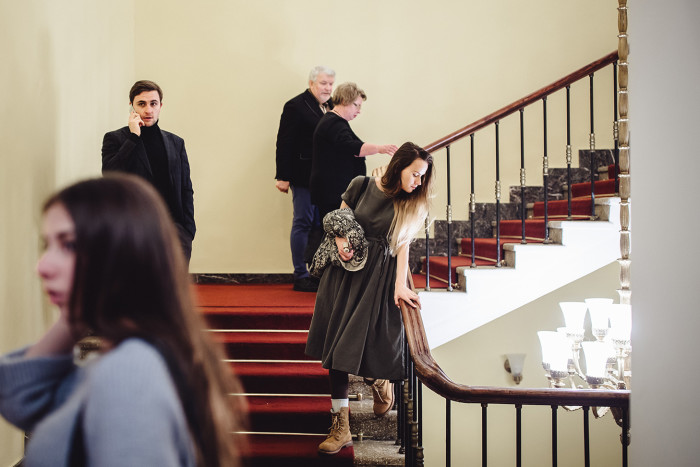
The ensemble cast of Smile Upon Us, Lord floats serenely above all these concerns, showing off some highly impressive clowning skills, soaking up the crowd’s appreciation and embodying the Vakhtangov Theatre’s stated mission: “To deal with complex moral issues” and “awaken warm human feelings in the audience”. The actor and director Yevgeny Vakhtangov, who originally founded the theatre in 1920, would be proud. His motto? “The quality to develop in an actor is courage.” In these complicated times, it might come in handy.
The Vakhtangov Theatre’s ‘Smile Upon Us, Lord’ is at the Barbican Theatre, London, from February 28-March 3. barbican.org.uk
Follow @FTLifeArts on Twitter to find out about our latest stories first. Subscribe to FT Life on YouTube for the latest FT Weekend videos
Comments